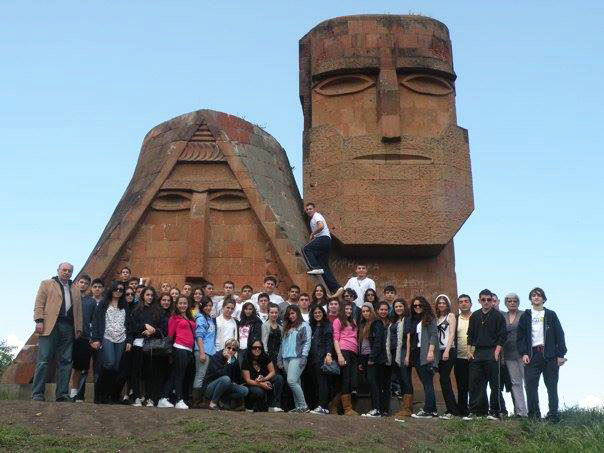Artsakh Awareness Week brings attention to regional conflict, Armenian history

(Courtesy of Natalie Kalbakian)
By Shreya Maskara
Nov. 21, 2014 7:47 a.m.
A war waging thousands of miles away forced Julie Avetisyan’s parents to flee their home in Baku, Azerbaijan, when they were 17 years old.
Avetisyan, now a first-year fine arts student and member of the Armenian Students’ Association, said her family was uprooted from their home during the Artsakh Liberation War, fought in the 1980s to the 1990s.
“I can’t even imagine what that must have been like for them,” Avetisyan said.
This week, the Armenian Students’ Association at UCLA organized Artsakh Awareness Week, an initiative meant to teach students about the region in the South Caucasus, which is historically called Artsakh and now referred to as the Nagorno-Karabakh Republic.
The Artsakh Liberation War was fought between the ethnic Armenians of Nagorno-Karabakh and the Republic of Azerbaijan after the decline of the former Soviet Union in the late 1980s. Control of the region is still disputed. It is currently under the control of the government of the unrecognized but de facto independent Republic of Nagorno-Karabakh.
Avetisyan said some of her cousins and other family members also fought in the war, which is a major reason she wants to share her culture with other members of the UCLA community.
“The story of Artsakh’s freedom is very similar to many that happen around the world, and it gives a chance for fellow Bruins to understand their extended family all over the world,” said Areni Der-Grigorian, a third-year anthropology student and political activism chair of the Armenian Students’ Association.
Artsakh Awareness Week included a display about the region called “What is Artsakh?” as well as a talk about the Artsakh Liberation War and presentations by Robert Avetisyan, the permanent representative of the Nagorno-Karabakh Republic to the United States.
“Artsakh is not a region that a lot of people know about, and with the recent escalation in violence, I think that it is our responsibility as Armenian students to raise awareness about the issue,” said Natalie Kalbakian, a third-year political science student and the group’s external vice president.
For students like Julie Avetisyan, whose family was uprooted by the Artsakh Liberation War, the week’s events are a chance for students to share the sacrifices that their family members made for freedom, Kalbakian said.
Some students said they were personally affected by the war because of the loss of their family members.
Mane Khachatryan, a fourth-year Russian studies student, said her uncle died fighting in the Artsakh Liberation War. Even though she had never met him, she said when she visited his grave two summers ago, she felt a connection.
“It was very uncanny, walking there on the streets feeling that a war had just happened. You could see the war’s effect, the destruction,” Khachatryan said.
Khachatryan added that she thinks the events pay homage to the soldiers who lost their lives in the battle. She added that she hopes the week helps second- and third-generation Armenian students understand the impact that the war has had on their culture and families.
Khachatryan said her father filmed the war from the front lines and that he was held hostage by troops because they suspected he was filming from beyond the border lines.
“Seeing the footage of the war and the destruction sent shivers down my spine,” Khachatryan said.
Avetisyan, who grew up in an Armenian household and went to Armenian school until the eighth grade, said her culture is an important part of her identity. She added that having a chance to visit Armenia in the summer of 2014 was an emotional experience.
“My first night in Armenia, when I opened the curtain, I couldn’t stop the tears from my eyes,” Avetisyan said.
Der-Grigorian said she hopes the awareness week will bring the conflict in the Artsakh region to the attention of UCLA students.
“It feels amazing when I see my friends and they ask me how the Artsakh Awareness Week is going,” Der-Grigorian said. “They are actually saying the word ‘Artsakh’ now. A year ago, they probably didn’t even know where it was.”


